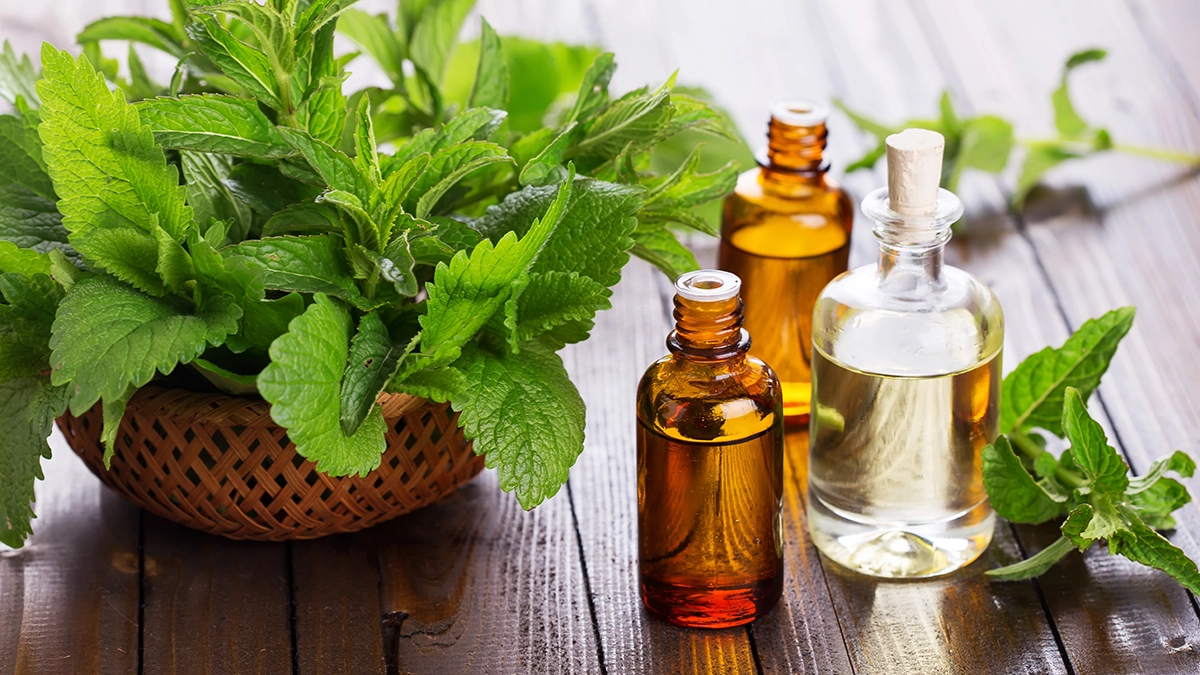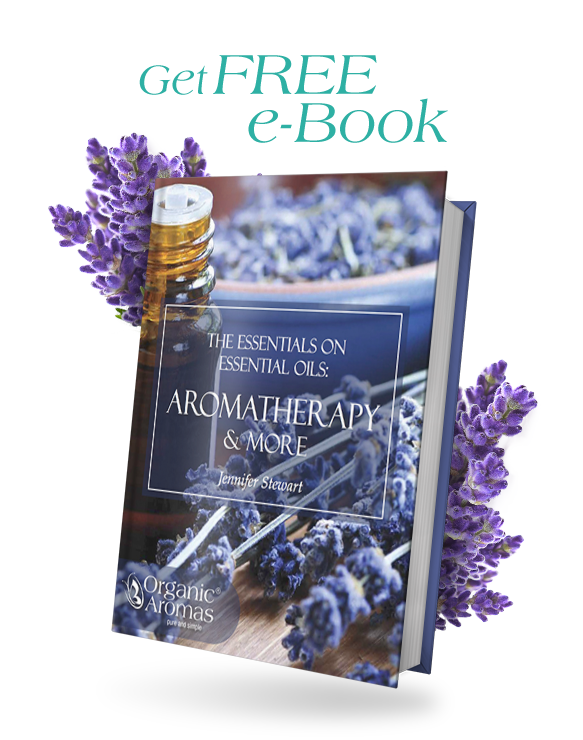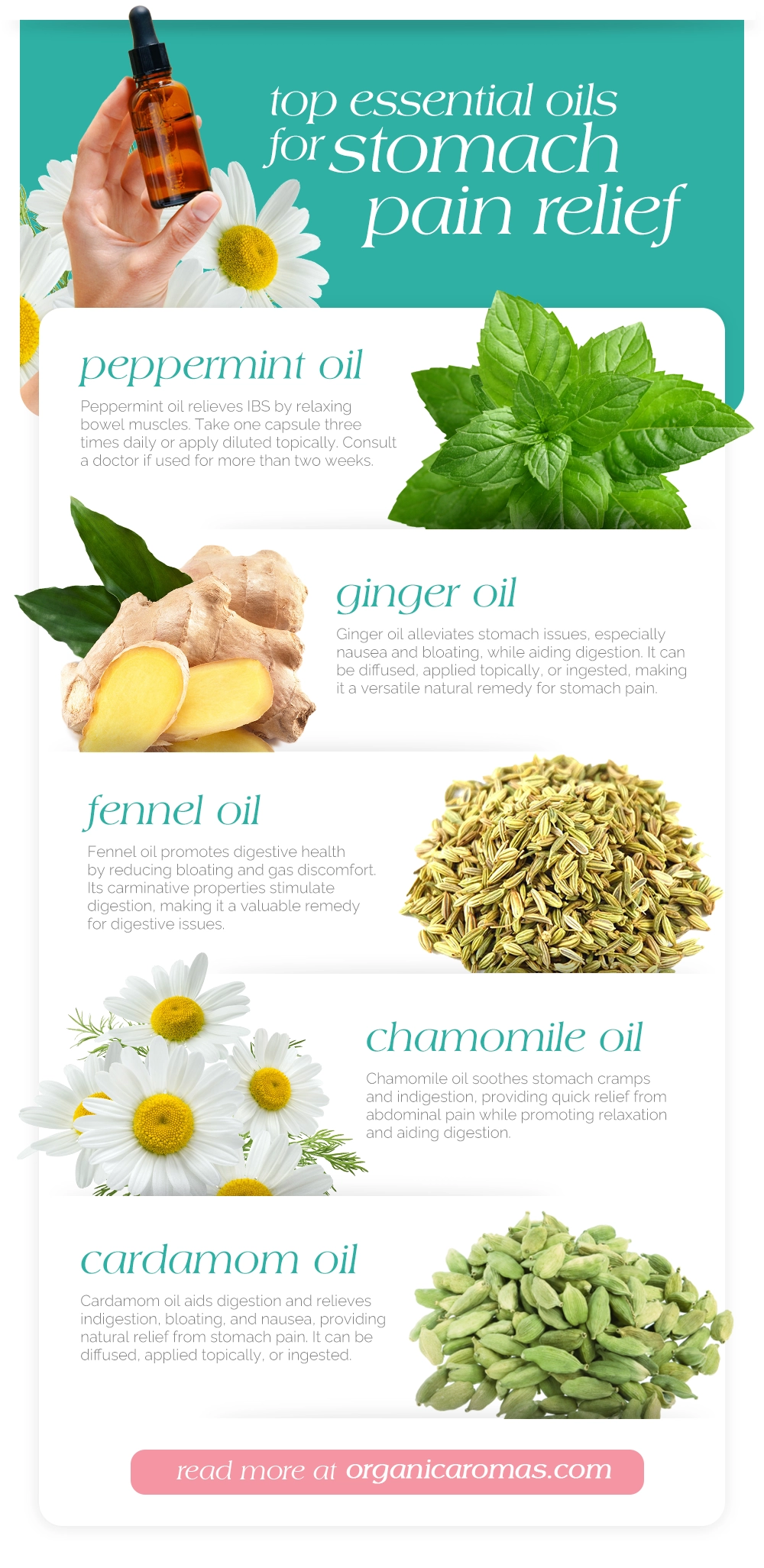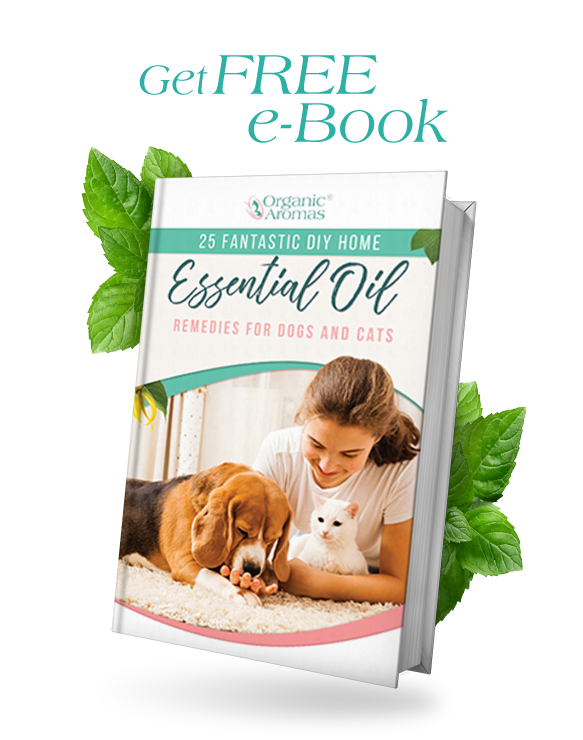Best Essential Oil for Stomach Pain: Natural Relief for Cramps and Bloating
*this is a review of literature on the subject and not intended to be used in lieu of advice provided by your physician
Feeling that all-too-familiar twist in your stomach? Before you reach for another antacid, consider this: nature’s pharmacy holds powerful, soothing remedies for your digestive woes. Essential oils can offer quick, effective relief from cramps, bloating, and indigestion without the side effects of conventional medicine. We’re going to give you the answers right here. Discover which essential oils are helpful, why they work, and how to use them safely and effectively. Your journey to natural, lasting relief starts now!
Best Essential Oils for Stomach Pain: Natural Remedies for Cramps, Bloating, and Indigestion
Feeling that all-too-familiar twist in your stomach? Before you reach for another antacid, consider this: nature’s pharmacy holds powerful, soothing remedies for your digestive woes. Essential oils can offer quick, effective relief from cramps, bloating, and indigestion without the side effects of conventional medicine. We’re going to give you the answers right here. Discover which essential oils are helpful, why they work, and how to use them safely and effectively. Your journey to natural, lasting relief starts now!
Key Takeaways: Scientifically-Backed Digestive Relief with Essential Oils
- Stomach pain can stem from conditions like Irritable Bowel Syndrome (IBS), indigestion, and stress. Research shows that lifestyle changes, such as dietary adjustments and stress management, are crucial in reducing these symptoms.
- Essential oils like peppermint, ginger, fennel, and chamomile have been scientifically proven to possess antispasmodic, anti-inflammatory, and carminative properties. These oils provide natural relief by relaxing the muscles of the digestive tract, reducing inflammation, and enhancing digestion.
- Studies highlight that these oils work by targeting multiple mechanisms, including reducing muscle spasms, alleviating gas, and modulating inflammation—offering effective relief from cramps, bloating, and indigestion.
- Safe use of essential oils requires proper dilution with carrier oils and an awareness of potential side effects. It is essential to consult a healthcare provider, particularly for pregnant women or those taking medications, to avoid complications.
- Using a nebulizing diffuser or similar devices can help enhance the therapeutic effects of essential oils by creating a calming environment that promotes both digestive health and overall well-being.
Understanding Stomach Pain and Its Causes

Stomach pain can manifest in various forms, from mild cramps to severe abdominal spasms. Pinpointing the underlying causes is necessary for effective treatment. One of the most common causes is Irritable Bowel Syndrome (IBS), a condition characterized by symptoms such as cramping, abdominal pain, bloating, and changes in bowel habits. IBS can be triggered by dietary choices, particularly certain foods and beverages like dairy, wheat, and carbonated drinks. Factors contributing to IBS include abnormal intestinal muscle contractions and nervous system issues that affect how the digestive system responds.
Stress is another significant factor that can exacerbate IBS symptoms, although it is not the direct cause of the condition. Early life stress has also been linked to an increased likelihood of developing IBS later in life. Lifestyle changes and relaxation techniques can mitigate these symptoms.
Indigestion, another common cause of stomach pain, occurs when stomach acid irritates the stomach lining, leading to discomfort and bloating. This can be triggered by overeating, consuming fatty or spicy foods, or drinking alcohol and caffeine. Bloating and gas often accompany indigestion, causing additional discomfort and abdominal pain.
Dietary adjustments can significantly improve digestive health. Incorporating a diet rich in fiber and a variety of fruits and vegetables can alleviate digestive problems. Reducing sugar intake and managing stress levels are key for promoting healthy digestion. Understanding these causes and making appropriate adjustments can help relieve indigestion and other digestive issues.
How Essential Oils Can Help with Stomach Pain

Essential oils possess remarkable properties that make them effective in alleviating stomach pain. Many essential oils have antispasmodic properties, which can help alleviate muscle spasms in the digestive tract, providing relief from stomach cramps. Additionally, their anti-inflammatory effects may reduce irritation in the stomach lining, making them beneficial for conditions like indigestion and acid reflux.
Carminative properties of certain essential oils aid in reducing gas and bloating by promoting digestion. For instance, caraway oil is known to help relieve indigestion and upset stomach. Essential oils can also improve bile production, further promoting digestive health. These combined effects make essential oils a powerful natural remedy for various digestive issues.
Using essential oils for stomach pain can provide quick relief and long-term benefits. Peppermint oil, for example, is widely recognized for its ability to relieve abdominal spasms and reduce bloating. Ginger oil is another essential oil that eases nausea and aids digestion. Knowing the specific benefits of each essential oil helps in choosing the most effective remedy for digestive discomfort.
How Essential Oils Can Help with Stomach Pain: The Science Behind It
Essential oils have been used for centuries to alleviate various digestive issues, including stomach pain, bloating, and cramps. These oils possess properties that can target the digestive system in multiple ways—offering relief through their antispasmodic, anti-inflammatory, and carminative effects. Let’s explore the science behind how specific essential oils can help with common stomach problems:
Peppermint Oil: A Powerful Antispasmodic
Peppermint oil is one of the most well-researched essential oils for digestive health. Its primary active ingredient, menthol, relaxes the smooth muscles of the gastrointestinal tract. By activating TRPM8 channels (cold receptors in the gut), menthol reduces visceral hypersensitivity—providing relief from symptoms of Irritable Bowel Syndrome (IBS), such as cramping, bloating, and pain.
- Clinical Evidence: A systematic review and meta-analysis found that peppermint oil significantly reduces abdominal pain and improves overall IBS symptoms. In one study, patients taking peppermint oil capsules experienced a 50% reduction in abdominal pain compared to a placebo group (Cash et al., 2016).
(https://consensus.app/papers/peppermint-oil-treatment-irritable-bowel-syndrome-cash/d4d38a16b620c575257f20d148f1fdf9/?utm_source=chatgpt) - Mechanism: The menthol in peppermint oil acts on the smooth muscle of the GI tract, reducing spasms and bloating by inhibiting calcium influx into smooth muscle cells, thereby inducing relaxation (Grigoleit & Grigoleit, 2005).
(https://consensus.app/papers/peppermint-oil-treatment-irritable-bowel-syndrome-grigoleit/837587d88c49108f1fa9d5e79a6d0aef/?utm_source=chatgpt)

Join Now and Get a Coupon for 10% Off!
Ginger Oil: Soothing Indigestion and Nausea
Ginger oil is well-known for its ability to soothe nausea and aid digestion. It contains bioactive compounds like gingerols and shogaols, which have been shown to stimulate digestion by enhancing gastric motility (the movement of food through the stomach) and preventing delayed gastric emptying.
- Clinical Evidence: A study demonstrated that ginger significantly accelerated gastric emptying in patients with indigestion, reducing symptoms of bloating and discomfort. Ginger was also found to reduce post-operative nausea by up to 40% (Ali et al., 2008).
(https://consensus.app/papers/mechanisms-actions-ginger-constituents-ali/97a01250dc2e8f17d20407152e10fc07/?utm_source=chatgpt) - Mechanism: Ginger works by inhibiting pro-inflammatory cytokines in the gut and enhancing the release of digestive enzymes. This reduces the inflammation that contributes to bloating and pain while promoting a smoother digestion process (Lete & Allué, 2016).
(https://consensus.app/papers/ginger-and-its-anti-inflammatory-properties-lete/85d61e6f94601d2fa3fc8fb67079dd9e/?utm_source=chatgpt)
Fennel Oil: Carminative and Gas-Reducing
Fennel oil is traditionally used to relieve bloating and gas due to its carminative properties. The oil stimulates digestion by promoting the secretion of gastric juices, which helps reduce the buildup of gas and aids in the smooth passage of food through the digestive tract.
- Clinical Evidence: A clinical study showed that fennel oil significantly reduced colicky symptoms in infants and reduced bloating and flatulence in adults. The carminative effect was linked to an increase in gastric motility and a reduction in the buildup of gas (Savino et al., 2007).
(https://consensus.app/papers/treatment-infantile-colic-double-blind-savino/c60a2e1db7ac000a9dc6455cdb0d1d1b/?utm_source=chatgpt) - Mechanism: Fennel oil contains anethole, a compound that reduces spasms in the gut muscles and inhibits excess gas production. This leads to a reduction in symptoms like bloating and abdominal discomfort (Cioanca et al., 2018).
(https://consensus.app/papers/fennel-foeniculum-vulgare-mill-valuable-plant-cioanca/7a6800494962f051d1fd7a793dcf44bb/?utm_source=chatgpt)
Chamomile Oil: Anti-Inflammatory and Soothing
Chamomile oil is widely known for its soothing effects on both the nervous system and the digestive tract. It is often used to relieve indigestion and stomach cramps. Chamomile’s anti-inflammatory properties are linked to its ability to inhibit COX-2 enzymes, which are responsible for inflammation.
- Clinical Evidence: Studies show that chamomile oil can reduce gastrointestinal spasms and inflammation, making it a good remedy for digestive discomfort. Chamomile extracts have also been used successfully in ulcer treatment due to their protective effects on the gastric lining (McKay & Blumberg, 2006).
(https://consensus.app/papers/chamomile-herbal-medicine-past-with-bright-mckay/2fffe1cae103ee0ca6c80246a442a812/?utm_source=chatgpt) - Mechanism: Chamomile works by modulating inflammatory pathways and reducing the activity of enzymes that cause inflammation in the stomach. Its antispasmodic effects help soothe the gut muscles and ease cramping and discomfort (Srivastava et al., 2010).
(https://consensus.app/papers/chamomile-novel-antioxidant-srivastava/d947da72a6d01157da92fe31325a9cfc/?utm_source=chatgpt)
Top Essential Oils for Stomach Pain Relief

Several essential oils are particularly effective in relieving stomach pain and promoting digestive health. Here are the top choices for natural relief:
- Peppermint oil
- Ginger oil
- Fennel oil
- Chamomile oil
- Cardamom oil
Each of these oils has unique properties that target different aspects of digestive discomfort, from reducing bloating and gas to soothing indigestion and cramps.
Consider the benefits of each essential oil and how to use them for maximum effectiveness.
Peppermint Oil
Peppermint oil is a powerhouse when it comes to relieving digestive issues. It works by relaxing the bowel muscles, which helps to relieve cramps and ease bloating. This oil is particularly effective for IBS symptoms, providing a natural remedy for those who suffer from this condition. The usual dosage for adults and children aged 12 and over is one capsule, three times a day, with the option to increase to two capsules if needed.
Peppermint oil is available in various forms, including capsules that can be purchased from pharmacies. These capsules may take a few hours to begin working, with full effects realized in one to two weeks. It is recommended not to take peppermint oil for longer than two weeks without consulting a healthcare professional. This ensures safe usage and prevents potential side effects.
For those who prefer topical application, peppermint oil can be diluted with a carrier oil like fractionated coconut oil to avoid skin irritation. Using peppermint oil in different forms tailors its application to specific needs, whether occasional stomach cramps or chronic digestive issues.
Ginger Oil
Ginger oil is renowned for its ability to alleviate various stomach issues. It is particularly effective in easing nausea, a common symptom of digestive discomfort. Ginger oil also reduces bloating, helping to relieve the uncomfortable feeling of fullness that often accompanies digestive problems. Additionally, it aids digestion, contributing to a healthier digestive process overall.
Adding ginger oil to your routine can significantly relieve stomach pain. Whether used in a diffuser, applied topically with a carrier oil, or ingested in small amounts, ginger oil’s therapeutic properties make it a versatile remedy for digestive issues. Its ability to soothe nausea and promote digestion makes it an excellent choice for those seeking natural relief from stomach pain.

Sign Up to Get Your FREE
e-Book Here…
Fennel Oil
Fennel oil is another essential oil that offers significant benefits for digestive health. It is particularly effective in decreasing bloating and alleviating gas discomfort. Fennel oil works by stimulating digestion, which helps to reduce the buildup of gas and promote a smoother digestive process.
For those struggling with frequent bloating and gas, fennel oil can be a game-changer. Its carminative properties make it an excellent choice for reducing digestive discomfort. Incorporating fennel oil into your routine can alleviate common digestive issues and improve overall digestive health.
Chamomile Oil
Chamomile oil is well-known for its soothing properties, particularly when it comes to digestive discomfort. It helps to soothe stomach cramps and indigestion, making it a valuable addition to your essential oil collection. Chamomile oil’s calming effects can provide quick relief from abdominal pain and promote relaxation, further aiding the digestive process.
Cardamom Oil
Cardamom oil is another powerful essential oil for digestive health. It is known for its therapeutic properties, particularly in promoting digestion and relieving common digestive issues such as indigestion and bloating. Cardamom oil eases nausea and can significantly improve symptoms related to stomach pain, providing natural relief without the need for over-the-counter medications.
Incorporating cardamom oil into your daily routine can help manage and prevent digestive discomfort. Whether used in a diffuser, applied topically with a carrier oil, or ingested in small amounts, cardamom oil’s soothing properties make it an excellent choice for those seeking natural relief from stomach pain.

Using Essential Oils Safely for Stomach Pain

While essential oils can provide significant relief from stomach pain, it is crucial to use them safely. Essential oils are highly concentrated substances that require careful handling to prevent skin irritation and other potential side effects. When applied topically, essential oils should be diluted with a carrier oil to mitigate these risks.
Consulting with a healthcare provider is essential, especially for pregnant women, as some essential oils may pose risks to both the mother and the fetus. Following guidelines and consulting professionals ensures safe enjoyment of essential oils for stomach pain relief.
Dilution with Carrier Oils
Diluting essential oils with carrier oils ensures safe topical application. Carrier oils like olive oil and fractionated coconut oil help to prevent skin irritation by reducing the concentration of essential oils. A typical dilution ratio is one drop of essential oil to a few drops of carrier oil, ensuring that the essential oil’s therapeutic properties are safely delivered without causing harm.
Using carrier oils such as sweet almond or macadamia oil can also enhance the application experience and provide additional skin benefits. Mixing essential oils with carrier oils enables safe skin application and relief from digestive discomfort.
Internal Use Guidelines
When ingesting essential oils, it is vital to start with a low dose, typically one to two drops, and not exceed the maximum recommended amount of up to 20 drops in a 24-hour period. Peppermint oil capsules, for instance, can generally be taken by adults and children aged 12 and over for IBS, but should not be taken within two hours of indigestion medicines.
Inform your doctor about other medicines, herbal supplements, or vitamins before using peppermint oil or any other essential oil internally to avoid potential interactions. If you take too much peppermint oil, seek medical advice immediately. These guidelines ensure safe and effective use of essential oils internally.
Aromatic Use
Aromatic use of essential oils involves inhalation, which can provide rapid relief from digestive distress. Inhaling essential oils directly from the bottle, a tissue, or using a diffuser are common methods that deliver quick benefits. Inhaling ginger oil quickly eases nausea, while peppermint oil relieves indigestion.
Using a diffuser to disperse essential oils into the air can create a calming environment, enhancing their therapeutic effects. This method provides continuous relief and easily integrates into daily routines.

Sign Up to Get Your FREE Essential Oils e-Book Here
Tips for Maximizing the Benefits of Essential Oils
Incorporating essential oils into daily routines maximizes their benefits. The inhalation of essential oils can trigger a calming effect on the nervous system, which may help in reducing stress-related stomach issues.
Combining oils in a calming environment enhances their effectiveness.
Lifestyle Adjustments
Making lifestyle adjustments can complement the use of essential oils for managing stomach pain. Eating smaller, more frequent meals throughout the day can help reduce feelings of fullness and discomfort, aiding digestion. Staying hydrated and incorporating dietary changes, such as reducing sugar intake, can also improve digestive health.
Combining these adjustments with essential oils significantly enhances digestive wellness and prevents stomach pain.
Combining Oils for Enhanced Effects
Blending various essential oils can produce synergistic effects that enhance their individual benefits for digestive health. For instance, blending peppermint and ginger oils can create a potent synergy that supports digestive health.
Essential oil blends effectively enhance overall digestive wellness. Experimenting with combinations helps find the most effective blend for specific needs.
Creating a Calming Environment
Creating a calming environment can significantly help in relieving discomfort associated with stomach pain. Essential oils like chamomile are recognized for their calming effects, helping to soothe stomach cramps and promote relaxation. A diffuser disperses essential oils into the air, creating a serene atmosphere that enhances their therapeutic benefits.
Utilizing a nebulizing diffuser, such as those made by Organic Aromas, can create a constantly aromatic environment, providing continuous relief from digestive discomfort. This approach not only soothes the stomach but also helps to relax the mind, creating a holistic healing experience.
Potential Side Effects and Risks
While essential oils offer numerous benefits, it is important to be aware of potential side effects and risks. Using undiluted essential oils on sensitive skin may lead to irritation or burns. Allergic reactions, including skin rashes, can occur in susceptible individuals exposed to essential oils. Therefore, proper dilution and patch testing are essential to minimize these risks.
Consulting with a healthcare professional before taking essential oils internally is crucial to determine safe dosages and avoid interactions with other medications. Additionally, certain essential oils can have phototoxic properties, making it necessary to avoid sun exposure after application. If symptoms do not improve after using peppermint oil, it is essential to speak to your doctor to rule out any serious conditions.
Common side effects of peppermint oil include minor issues or no side effects at all, but more serious reactions can occur in rare cases. It is advisable to avoid drinking alcohol while taking peppermint oil capsules to prevent adverse interactions. Being informed and cautious allows safe enjoyment of essential oils.

Sign Up to Get Your FREE Pets
e-Book Here…
Essential Oils to Avoid During Pregnancy
Before: Pregnant women should exercise caution when using essential oils, as some may pose risks to both the mother and the fetus. Essential oils such as fennel and cardamom should be avoided during pregnancy as they may stimulate uterine contractions. Additionally, essential oils like aniseed, basil, and birch are also not recommended for pregnant women.
After: Pregnant women should exercise caution when using essential oils, as some may pose risks to both the mother and the fetus. Here are some essential oils to avoid during pregnancy:
- Fennel
- Cardamom
- Aniseed
- Basil
- Birch
Ingesting even small amounts of essential oils can cause significant poisoning, so handling them with care is crucial. Symptoms of essential oil toxicity may include drowsiness, seizures, and respiratory issues.
Always consult with a healthcare provider before using essential oils during pregnancy to ensure safety for both mother and child.
Summary
In summary, essential oils offer a natural and effective way to alleviate stomach pain and improve digestive health. From the antispasmodic properties of peppermint oil to the soothing effects of chamomile oil, these natural remedies can provide relief from a variety of digestive issues. By using essential oils safely and incorporating them into your daily routine, you can enhance your overall well-being and enjoy a healthier digestive system. Remember to consult with healthcare providers when needed and make informed decisions to maximize the benefits of these powerful natural therapies.

Join Our Exclusive Member Club to get Big Discounts!
Frequently Asked Questions
Can essential oils really relieve stomach pain?
Indeed, essential oils can effectively relieve stomach pain due to their antispasmodic, anti-inflammatory, and carminative properties, which help alleviate cramps, reduce bloating, and promote digestion.
How should I use peppermint oil for stomach pain?
Peppermint oil can be effectively used for stomach pain by taking one capsule three times a day for adults and children aged 12 and over, or by applying it topically when diluted with a carrier oil. Always ensure to follow appropriate dosage and dilution guidelines for safety.
Is it safe to ingest essential oils?
It is not generally safe to ingest essential oils without medical guidance. Always consult a healthcare provider first to determine appropriate dosages and potential interactions with other medications.
What are the potential side effects of using essential oils?
Using essential oils may lead to skin irritation, allergic reactions, and possible interactions with medications. It is essential to dilute oils properly and seek guidance from a healthcare provider prior to use.
Are there any essential oils to avoid during pregnancy?
It is crucial to avoid essential oils like fennel, cardamom, aniseed, basil, and birch during pregnancy due to potential risks to both the mother and the fetus. Prioritizing safety in your choices is essential for a healthy pregnancy.








Very interesting